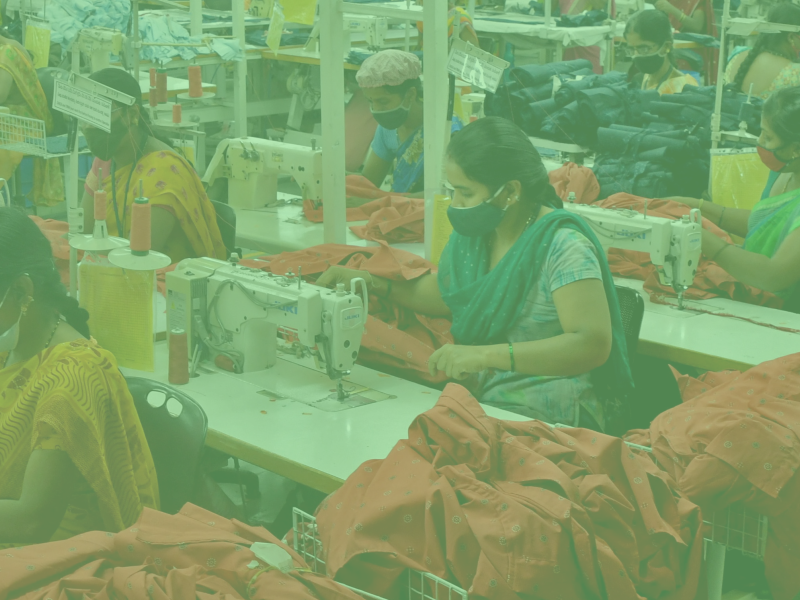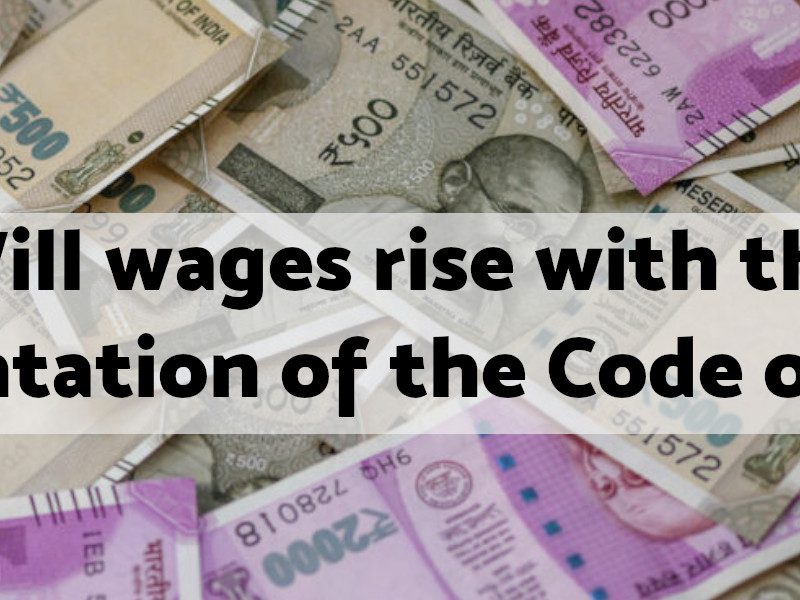This Women’s Day we look back on some of the key struggles of working women across the world that not just changed immediate conditions of the protesting women but also laid the path for working people, both men and women, to see the world through a different lens.
When Dalit Women Tea Workers stood up for their political voice
The global tea giant Tata Tea began restructuring itself in the 1990s and began divesting from their plantations which were no longer making profits at their expected scale. Despite opposition, the Tatas succeeded in withdrawing themselves from their south India plantations in 2005 by creating a unique model of ownership, which came to be known as the Kannan Devan model.
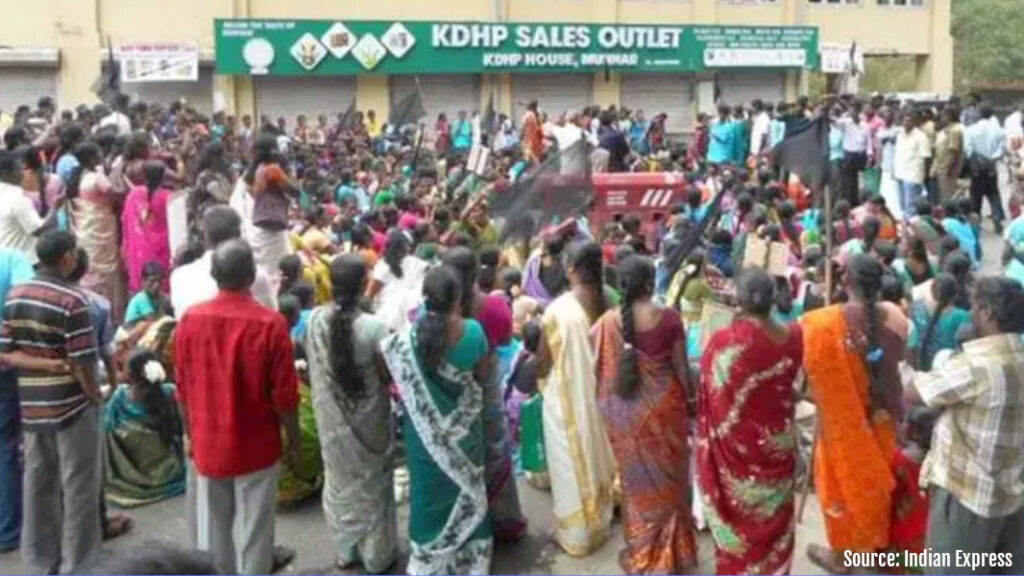
Kanan Devan Hills Plantations Company is known as the largest ‘employee-owned tea company’ in the world, where about 60% of the subscribed share capital of the company is held by 99.9% of its employees, Tata Global Beverages holds 28% and the remaining 12% is held by a number of other private investors. This was a unrivaled restructuring strategy that transferred the burden of the plantations to the workers while the Tatas retained control over the management of the company through their minor 28% stake. The trade unions in the plantation industry, led mostly by outside male political leadership failed to understand the implication of this and convinced the workers, mostly dalit women brought in generations earlier from Tamil Nadu, to buy the company shares promising better working and living conditions. Interestingly however, the Tatas failed to convince the trade unions in their Northern India operations in West Bengal and Assam. The unions refused the worker ownership model and forced the Tatas to sell their plantations to a new company, the Amalgamated Plantations.
The dalit tea pluckers in Kerala are mostly women who work upto14 hours a day, six days a week, rain or shine to meet their high production target of 31 kg of leaves per day for which they were paid a daily wage of Rs. 232, when the average agricultural wage in the state was more than Rs. 500. This low wage is set through collective bargaining within a Plantation Labour Committee (PLC), that includes representatives of ‘recognised’ trade unions, management, and the government.
On 5 September 2015, hundreds of women workers, united under the banner ‘Pombilai Orumai’, marched to the headquarters of the Kanan Devan Hills Plantations Ltd., challenging their own trade unions, demanding an increase in their wages and bonus. This was in response to the management PLC decision to cut that year’s bonus to 10% from 20% given in the previous year. In the next nine days of intense struggle, it transformed into a united resistance movement with thousands of Dalit women irrespective of their political union affiliation joining in their revolt against capitalism and patriarchy, including within their own unions.
The struggle was a success in:
- Forcing the management to accept the 20% bonus of which they agreed to pay 8.33% as bonus and 11.67% as an ex-gratia payment.
- Forcing the trade unions, that had earlier agreed to the Rs 232 wage, to change their demand to Rs 500 and began pressing for it. Eventually the management agreed to a wage increase to Rs. 301 – an unprecedented 30% increase.
- Showing the divided trade union movement the strength of an united working class struggle that bound all the workers through their dalit identity and their common history of exploitation.
When Women said NO to domestic violence
In January 1990, the national literacy movement was launched in Nellore district of undivided Andhra Pradesh. The state-organized adult-literacy drive created a collective space for women to critically analyse the challenges in their lives and discuss possible solutions. Domestic violence and alcoholism emerged as a central issue of concern.
The movement started at the Doobaguta village in Nellore district when women got together and stopped the vending of arrack in the village when two men died after drinking. There was both anger and awareness amongst the women about the acute social problems caused by excessive drinking, of men drinking away family earnings while women bearing its burden. This Doobaguta incident was described in a lesson in the post-literacy primer. The lesson elucidated the violence women endured due to alcoholism, how they organised themselves to take collective action, and about their success. This lesson became the trigger for women who read these at the post-literacy centres. In several villages women’s committees were formed. And the agitation against the sale of arrack began with round the clock vigil maintained by the women’s squads to stop sale of arrack. What started as an agitation at the village level, soon turned into a state-wide agitation against not just the liquor contractors but against the local bureaucracy, police officials and even the Chief Minister. The women were demanding a complete ban on arrack.
The movement brought out the close link of alcoholism and patriarchy within society from the home to the highest level of state authority – how alcohol consumption is normalised by a patriarchal society to establish masculinity and control over women through violence.
With the movement spreading across districts, the government was forced to buckle under the pressure and ban arrack across the state and launch a larger public campaign to create awareness against the consumption of liquor.
This movement, very much like the Brazilian popular education movement of the 1960s that succeeded in radicalizing the farmers’ movement, students’ movement and strong trade unions which formed the base for the anti-dictatorship struggles in the next decade, showed the power of popular education and literacy programmes in mobilizing public opinion and building a strong democratic and progressive movement.
“Irippu samara” – When smiling faces stood up for their right to sit
When you visit a saree or jewellery store or buy coffee from a starbucks you meet smiling sales women and men standing, ready to serve your need. Do you ever wonder why you never see them sitting? This is because they do not have the right to sit. Workers in shops are forced to stand for long hours without rest, with limited toilet breaks, and in many cases without access to any. The legal provision for such breaks was unspecified under the existing law, the Shop and Establishment Act.
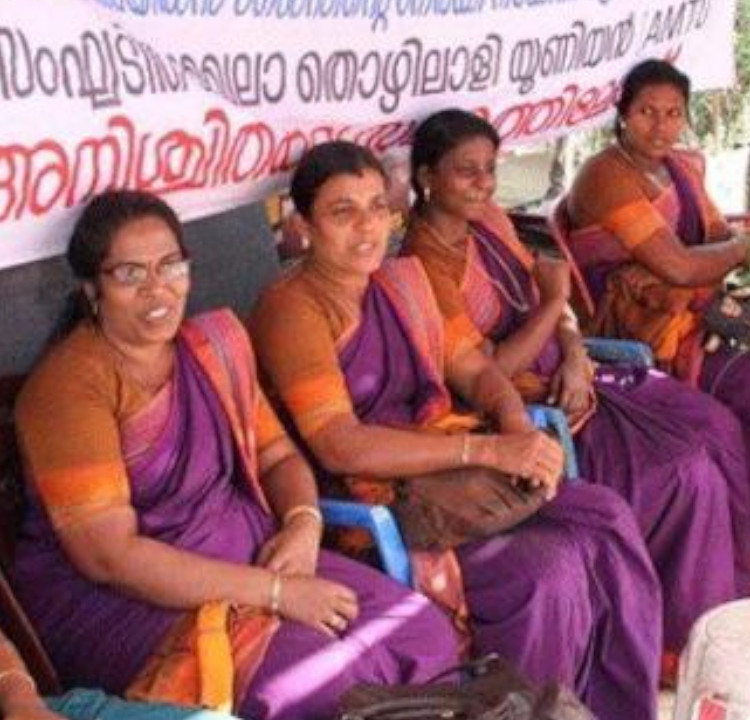
In December 2013, five women sales workers at Kalyan Sarees in Thrissur, Kerala went on strike demanding a right to take toilet breaks, a right to sit (“irippu samara”) and a right to minimum wage. These 5 women were suspended and it was only after three months of continuous protests that the management acceded to all their demands and revoked their suspension. However, within a few months the situation reversed once again. The women did not give up hope. They filed a petition with the national human rights commission and eventually the commission directed the state government to take appropriate action. In 2014, the Kerala government passed an ordinance amending the Kerala Shops and Commercial Establishment Act, 1960 but did not extend its scope to protect the interests of workers in the informal sector. It took four years for the government to finally bring in an amendment to the law in 2018 that guaranteed a minimum monthly was of Rs. 10,000 rupees, an eight-hour workday, a chair or stool to sit, an afternoon tea break, and a lunch break.
This unique protest won popular support of not just other workers but of customers too. The domino effect was seen in Tamil Nadu where a similar demand was raised and the state law amended there as well.
Under the glitterati lies the true face of global corporations
While Google celebrated Savitribai Phule through its doodle with trending hashtags and the social media plastered with praises for Google for being a progressive and socially sensitive company, Google unceremoniously terminated Timnit Gebru, a US based data scientist of Ethiopian origin who was the co-head of a team constituted by Google to study the social and ethical ramifications of artificial intelligence deployed by the company. Gebru was further defamed online by publishing her correspondence with the human resource department and threatened her of legal action and penalties if she spoke to the media against the company.
Artificial Intelligence is an umbrella term used for software which helps machines learn by observing vast amounts of data. Timnit Gebru’s research paper found that there was an inherent racial bias in which the software was being developed. It was skewed against women and non-white people. In another paper which remains unpublished to date, Timnit discovered that the language learning software was an inefficient electricity guzzling machine and that the model would have huge environmental impact on our planet. The company has been dogged in recent years by accusations from employees that it mistreats women and people of colour, and from lawmakers that it wields unhealthy technological and economic power. Google went on a full offensive to stop the word from getting out. But following a massive negative publicity over the circumstances of Gebru’s exit, Sundar Pichai, CEO of Alphabet, Google’s parent company, publicly apologized on Twitter without clarifying whether she was terminated or resigned.
Gebru’s termination opens up a larger question: the inherent contradiction in an industry’s efforts to research the downsides of its favourite technology – in this case – artificial intelligence. If algorithms decided who got admission in a college or who could get a bail in a trial, their impact would be life altering and if this algorithm was inherently prejudiced, the consequences would be devastating.
The termination from Google however did not deter Gebru. In a world when much of our decisions get pre-determined through biased artificial intelligence, this crusade to expose these prejudices are as crucial as fighting for basic needs. In 2021, Gebru launched the Distributed Artificial Research Institute (DAIR) which documents the effect of artificial intelligence on marginalized groups, with a focus on Africa and African immigrants in the United States to expose the harmful impact of big data giants on our society.
The Day Women took a Day Off

Iceland, a small Nordic island in the North Atlantic ocean, is not just the home to reindeer and artic fox, it is consistently ranked as the most gender-equal society in the world!
The UN declared 1975 to be the International Year of Women. A small radical group of mostly working-class women, called the Red Stockings, decided to organise a ‘women’s day off’ (Kvennafrídagurinn) to highlight the huge gender pay disparity existing in Iceland – women were paid less than 60% of what men were paid for doing the same work. Large number of women’s organisations of Iceland joined in and spent months creating awareness among women about their rights, organising and politicising them.
On 24 October 1975, more than 90% of all women in Iceland took a day off work in farms, factories and establishments of all kinds, stopped cooking and caring at home across the country to show how indispensable and crucial they are to society. They asserted their collective power against the patriarchal society by organising huge protests, holding local discussions, organising cultural programmes demanding “equal pay for equal work”. It was a day when not just the economy came to a standstill, men, for the first time were left to deal household chores that they never shared.
Iceland’s parliament passed a law guaranteeing equal pay the following year and in November 1980, the country elected Vigdis Finnbogadottir, a divorced single mother, as the president of Iceland. She was Europe’s first female president, and the first woman in the world to be democratically elected as a head of state.
How women forced a country to change its constitution
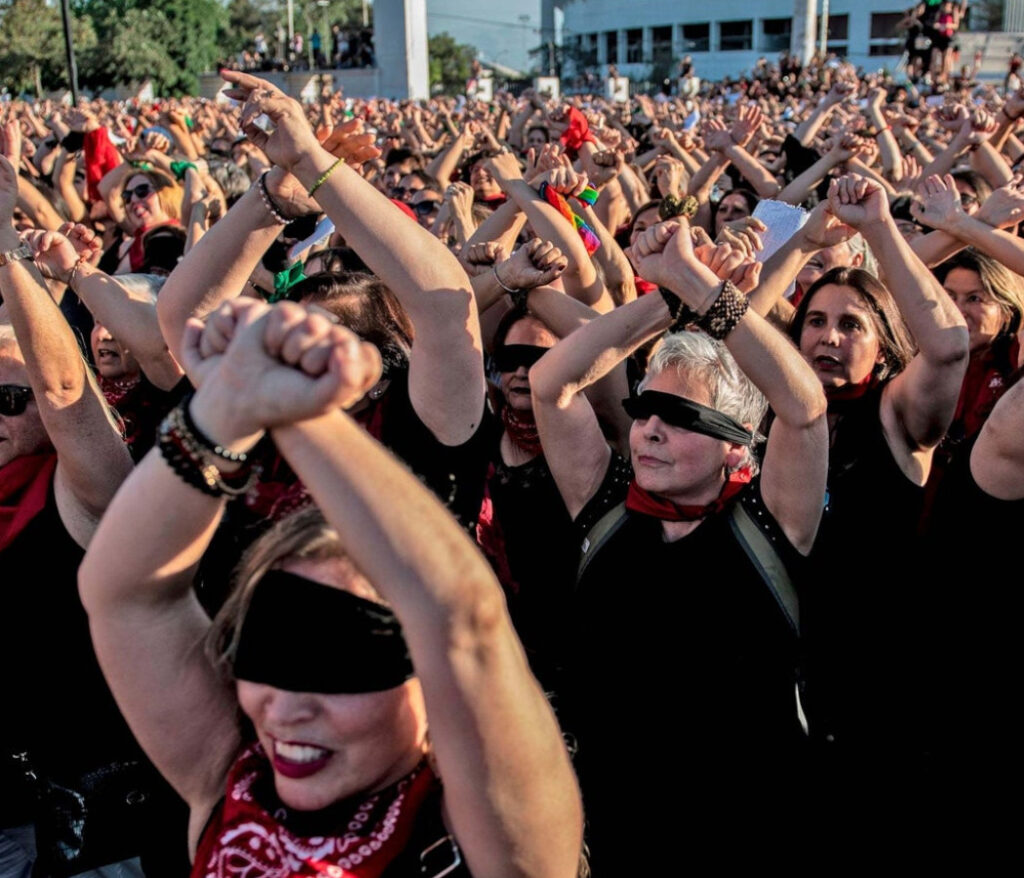
Anger erupted in the streets of Chile in October 2020 with a series of nationwide protests against inequality, social injustice and the high cost of living across Chile. Violent clashes between protesters and police resulted in more than 30 dead, thousands injured and 445 with eye injuries caused by police weapons – leaving 34 people blinded. The protestors, mostly women, were fighting for the right to legal abortion, an end to domestic violence, and for greater equality in the workplace. The Chilean Network Against Violence Towards Women calculates that an average of 130,000 cases of domestic violence are reported in Chile each year. Each day, 42 cases of sexual abuse are reported to the police – only 25.7% of which result in judicial rulings. In 2019, 46 women were murdered by their partners.
Popularised by the anti-rape song by a Chilean feminist collective, A Rapist in Your Path, protests led by women from October 2019 for equality and fair access to health, pensions and education expanded to a demand for an overhaul of the entire political framework. The protests led to a referendum for a new constitution for Chile. Chileans voted by a 79% landslide majority, with its working-class constituency favouring a constitutional assembly comprising of directly elected citizens and social movement activists ensuring gender parity. This was opposed by the right-wing parties but won approval in the Congress.
The existing constitution was drawn up in 1980 during the Pinochet dictatorship and chiefly authored by a conservative Catholic lawyer, which prioritizes a market-driven economy ignoring citizens’ rights to guaranteed healthcare, education and pensions.
The new constitution envisages to establish parity of power. This has been a historical moment in which a women’s struggle against violence was instrumental in overhauling the entire political structure that oppresses people. This movement did not emerge from nowhere – it owed its origin to the 2017 No Más AFP campaign — a social movement against Chile’s privatized pension system, the penguin revolution of 2011 led by students demand for free, non-sexist public education, and then 2018 the Feminist General Strike in Chile when one hundred thousand women from 28 cities marched on Santiago’s main thoroughfare. These were women that fought for seeds, for housing, for territory, for education, for health, for work, for pensions, against violence, for abortion. They raised different kinds of strike committees: by territory and sector, by union, by educational institution, by social setting, and by sexual orientation. They raised brigades of art and propaganda for the diffusion of their programme. All these finally culminated in the outburst of 2020 that led to the referendum.
“The story of women’s struggle for equality belongs to no single feminist nor to any one organization but to the collective efforts of all who care about human rights.”
Gloria Steinem


